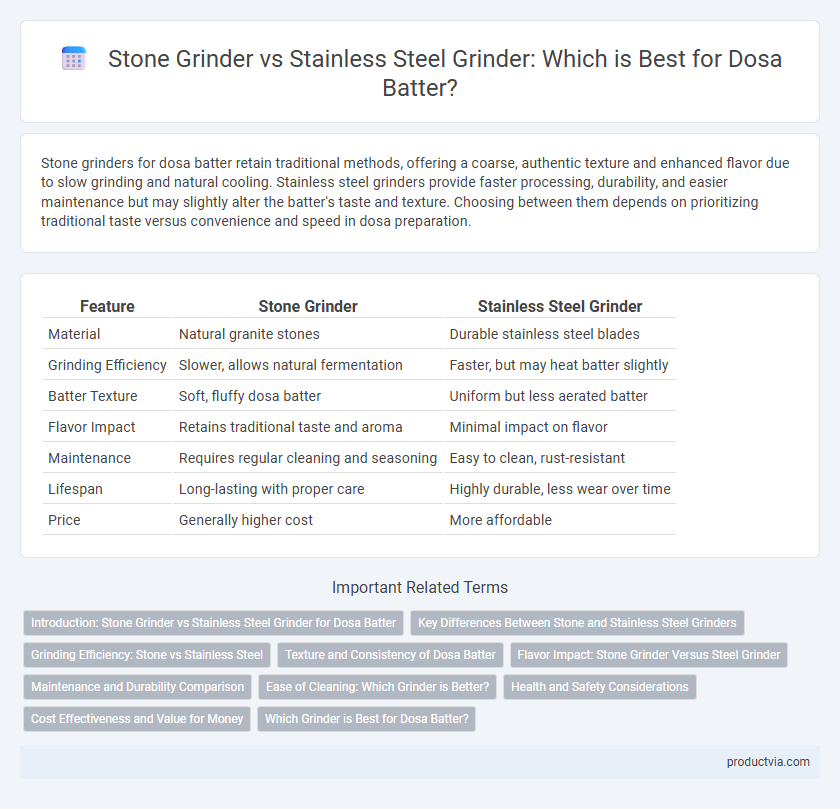Stone grinders for dosa batter retain traditional methods, offering a coarse, authentic texture and enhanced flavor due to slow grinding and natural cooling. Stainless steel grinders provide faster processing, durability, and easier maintenance but may slightly alter the batter's taste and texture. Choosing between them depends on prioritizing traditional taste versus convenience and speed in dosa preparation.
Table of Comparison
| Feature | Stone Grinder | Stainless Steel Grinder |
|---|---|---|
| Material | Natural granite stones | Durable stainless steel blades |
| Grinding Efficiency | Slower, allows natural fermentation | Faster, but may heat batter slightly |
| Batter Texture | Soft, fluffy dosa batter | Uniform but less aerated batter |
| Flavor Impact | Retains traditional taste and aroma | Minimal impact on flavor |
| Maintenance | Requires regular cleaning and seasoning | Easy to clean, rust-resistant |
| Lifespan | Long-lasting with proper care | Highly durable, less wear over time |
| Price | Generally higher cost | More affordable |
Introduction: Stone Grinder vs Stainless Steel Grinder for Dosa Batter
Stone grinders retain traditional qualities essential for authentic dosa batter, preserving the natural flavor and texture while ensuring a slow, even grind that enhances fermentation. Stainless steel grinders offer greater durability, easier maintenance, and faster grinding but may generate heat that can affect the batter's taste and fermentation process. Selecting between stone and stainless steel grinders depends on balancing the importance of flavor preservation against convenience and efficiency in dosa batter preparation.
Key Differences Between Stone and Stainless Steel Grinders
Stone grinders retain the authentic flavor and texture of dosa batter by slowly grinding rice and lentils, preserving natural enzymes and nutrients essential for fermentation. Stainless steel grinders offer faster processing and easy maintenance but may generate heat that can affect the batter's fermentation quality and taste. The key differences lie in material, grinding mechanism, heat generation, and impact on batter texture and fermentation.
Grinding Efficiency: Stone vs Stainless Steel
Stone grinders provide superior grinding efficiency for dosa batter due to their ability to retain moisture and generate less heat, resulting in a smoother and more consistent batter texture. Stainless steel grinders, while faster and easier to clean, tend to produce more heat that can alter batter fermentation and affect flavor. The porous nature of stone enhances nutrient retention, making it the preferred choice for authentic dosa preparation.
Texture and Consistency of Dosa Batter
Stone grinders produce dosa batter with a naturally smooth and creamy texture due to their slow grinding process that preserves the batter's moisture and grain integrity. Stainless steel grinders often yield a finer, more uniform consistency quickly but may result in a slightly less creamy batter because of faster grinding speeds generating heat. For authentic dosa texture and fermented batter quality, stone grinders are preferred as they enhance flavor development and batter aeration.
Flavor Impact: Stone Grinder Versus Steel Grinder
Stone grinders enhance dosa batter flavor by gently grinding grains and preserving natural oils, resulting in a richer, more authentic taste. Stainless steel grinders efficiently process batter with higher speed but may generate heat, causing slight flavor alterations and reduced aroma. The choice between stone and steel grinders significantly influences the dosa's texture and overall taste profile.
Maintenance and Durability Comparison
Stone grinders for dosa batter offer superior durability with their natural abrasion resistance and require minimal maintenance, often involving only periodic oiling of the stone surface. Stainless steel grinders, while easier to clean due to their non-porous surface, may suffer from corrosion and wear over time, demanding more frequent upkeep to maintain optimal performance. Both materials impact batter texture differently, but stone grinders generally provide a longer lifespan and consistent maintenance routine ideal for heavy usage.
Ease of Cleaning: Which Grinder is Better?
Stone grinders for dosa batter often require more effort to clean due to their porous surfaces that retain batter residues, whereas stainless steel grinders offer smoother surfaces that prevent sticking and enable faster, more thorough cleaning. Stainless steel grinders resist corrosion and staining, making them more hygienic and easier to maintain over time. For users prioritizing ease of cleaning and minimal maintenance, stainless steel grinders provide a clear advantage compared to traditional stone grinders.
Health and Safety Considerations
Stone grinders preserve the natural nutrients and texture of dosa batter without leaching harmful substances, making them safer for long-term use. Stainless steel grinders are easier to clean and are resistant to rust, reducing the risk of bacterial contamination. Choosing a stone grinder ensures traditional flavor and minimal chemical exposure, while stainless steel offers hygienic benefits and durability.
Cost Effectiveness and Value for Money
Stone grinders offer superior flavor and texture for dosa batter due to their natural grinding action, but they tend to be more expensive and require regular maintenance. Stainless steel grinders are more cost-effective with lower upfront costs, easier cleaning, and durability, making them a practical choice for budget-conscious users. Evaluating long-term value, stone grinders deliver premium quality batter, whereas stainless steel grinders balance affordability and functionality efficiently.
Which Grinder is Best for Dosa Batter?
Stone grinders are preferred for dosa batter due to their ability to grind grains slowly and evenly, preserving the batter's texture and enhancing flavor through natural heat absorption. Stainless steel grinders offer faster processing but may generate heat that affects fermentation and the batter's consistency. For authentic dosa batter with ideal fermentation and taste, a stone grinder remains the best choice.
Stone grinder vs stainless steel grinder for dosa batter Infographic

 productvia.com
productvia.com